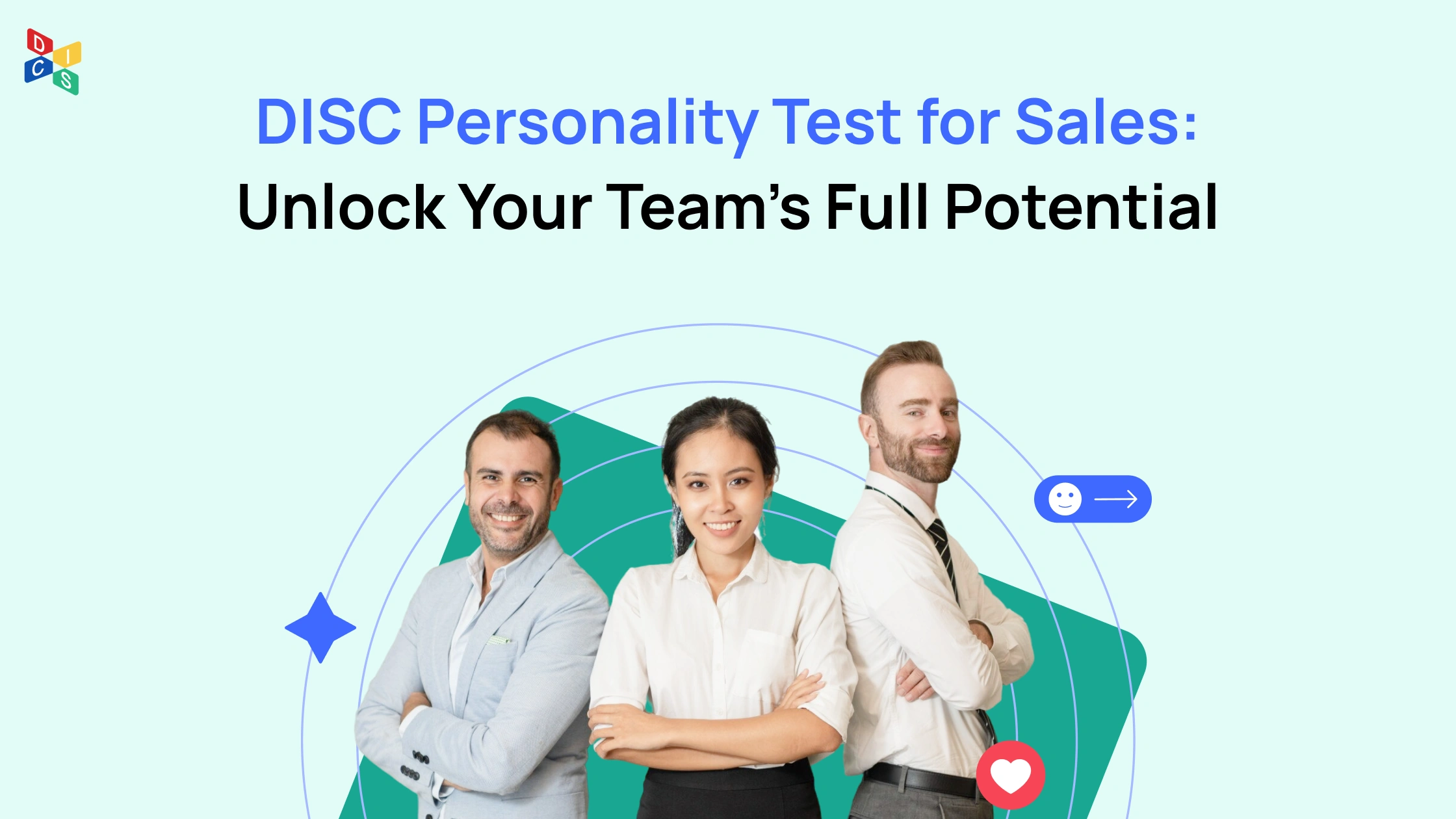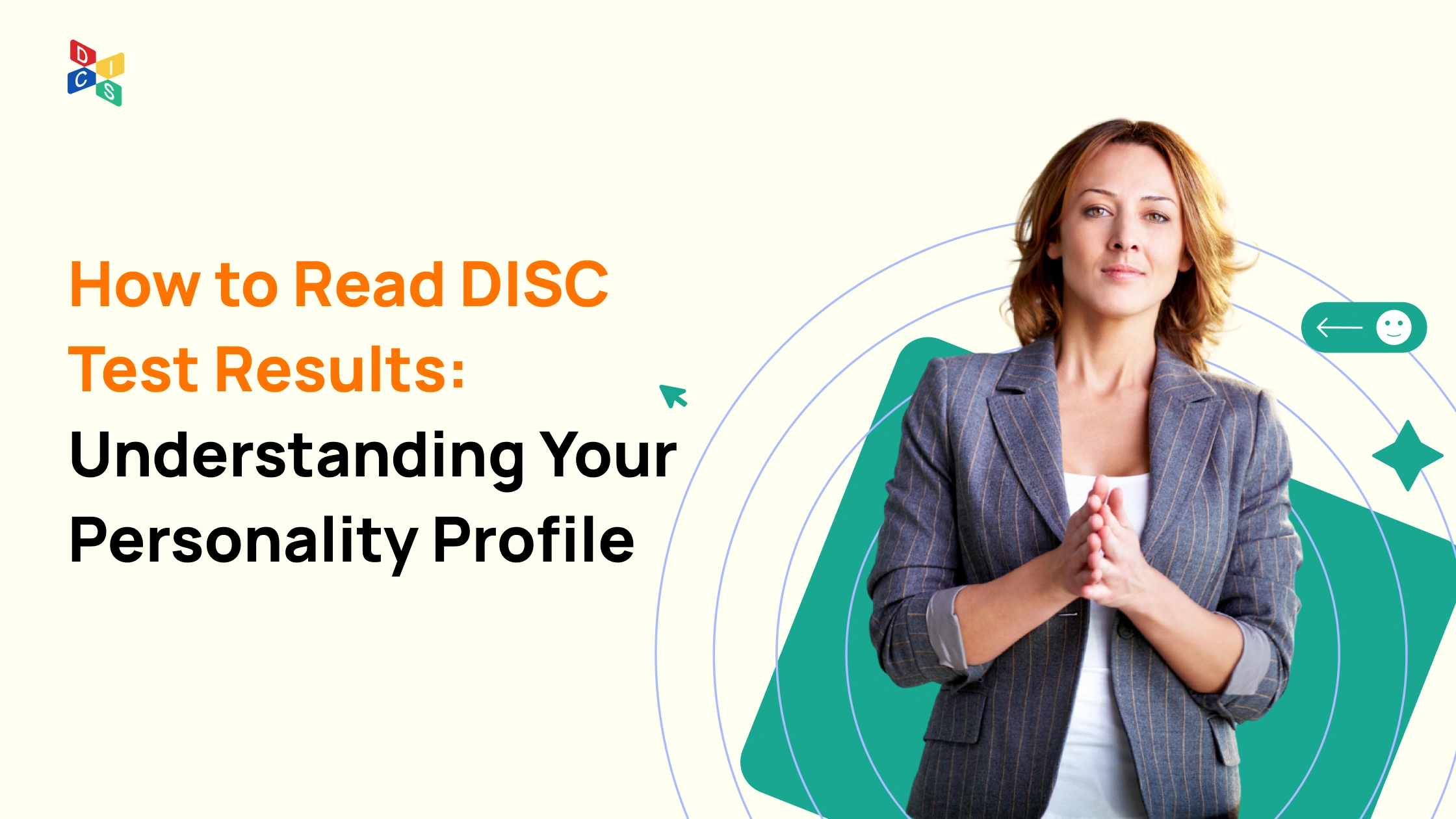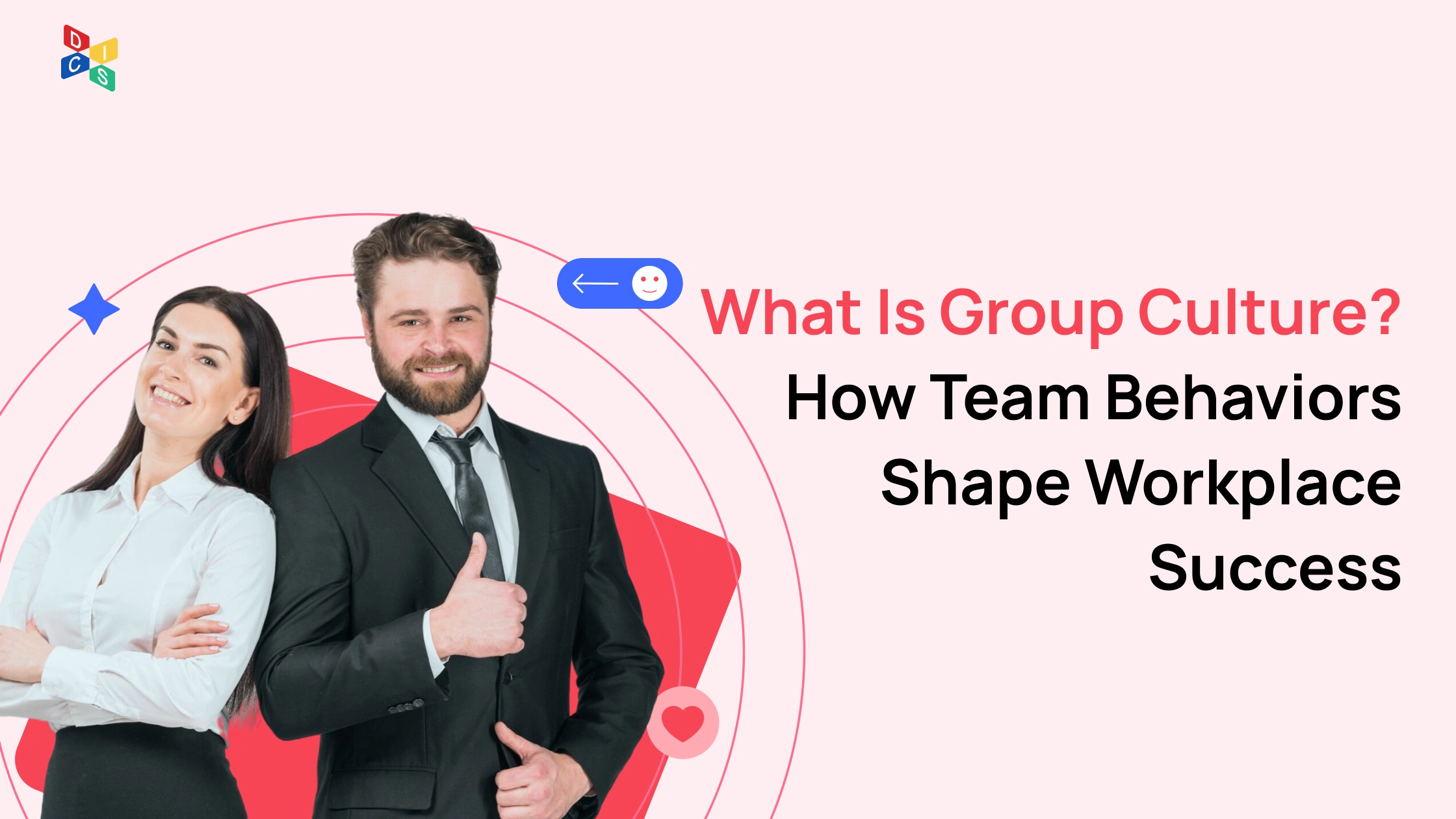Table of content
DISC Test I Personality - Traits, Strengths, and Challenges
Learn about the DISC Test I Personality’s key characteristics, strengths, and potential challenges, how this style impacts workplace dynamics.
Curious about the DISC Test I personality and how it shapes behavior? This blog breaks down everything you need to know about them - from their core traits to their strengths, challenges, and workplace dynamics. Whether you're looking to understand yourself better or improve collaboration with I-type personalities, this article has you covered.

Core Characteristics of DISC Test I Personality
What is the I in the DISC personality test? The "I" personality type, often known as the Influencer, is one of the four major DISC types. This style is characterized by exuberance, vivacity, and a focus on others. They place a high priority on building relationships and persuading others through their charisma and communication.

Group I thrive in social situations and are often described as cheery, sociable, and outgoing. The "I" style is associated with persuasiveness, friendliness, and a natural ability to express oneself. Learning about these qualities may help you better understand how people with this personality type behave and deal with various situations.
Read more: What Do The Letters in DiSC Stand For? Understanding the 4 DiSC Personality Types in 2025
Enthusiastic and Optimistic
One of the most distinguishing features of the DISC test I personality is its level of enthusiasm. They pursue new experiences with zeal and maintain an optimistic outlook on life. Those around them are typically inspired and driven by their contagious enthusiasm. Their positive outlook is driven by their predisposition to see the best in people and situations.
For example, a salesperson with an "I" approach can get a presentation off to a good start by sharing success stories and exhibiting genuine enthusiasm for the product's potential. This energy can attract customers and foster a good environment.
Advantages:
- Creates a positive and motivating environment.
- Increases team morale and encourages participation.
- Facilitates networking and relationship building.
Disadvantages:
- May be perceived as unrealistic in serious situations.
- Can sometimes overlook potential problems or challenges.

Outgoing and Sociable
DISC test I personality individuals thrive in social settings and enjoy interacting with a wide range of people. They are typically described as expressive, affable, and friendly. They are frequently at ease in social settings and have an innate capacity to connect and form relationships.
To ensure that everyone feels included and welcome, an event planner with a strong "I" style will actively communicate with guests. They will make introductions, facilitate discussions, and foster a lively atmosphere.
Advantages:
- Builds strong networks and connections.
- Enhances collaboration and teamwork.
- Creates a positive and inclusive environment.
Disadvantages:
- May struggle with tasks that require solitary work.
- Can be perceived as overly talkative or attention-seeking.
Discover Now: Understanding the 16 DISC Personality Types: Why and How It Matters?
Persuasive and Influential
DISC personality test type I style are naturally effective at convincing others to agree with them by appealingly articulating their ideas. They are effective at influencing and encouraging people due to their zeal and strong communication skills. They regularly use their charm and charisma to persuade others and get their support.
A project manager with an "I" style, for example, can successfully unite his or her team by encouraging them with a clear vision and emphasizing the benefits.
Advantages:
- Motivates others to achieve goals.
- Facilitates buy-in and consensus-building.
- Enhances communication and collaboration.
Disadvantages:
- May make unrealistic commitments.
- Might struggle with situations that require a more direct or assertive approach.

Relationship-oriented
The DISC test I personality value people and prioritize building and maintaining connections. They prefer to get to know individuals personally and express genuine interest in them. They are good team members and collaborators because they place a high value on connections. In their relationships, they typically place a high priority on harmony and constructive communication.
For example, a teacher who takes an "I" approach will spend time getting to know each student, learning about their hobbies, and creating a good, supportive environment in the classroom.
Advantages:
- Fosters strong team cohesion and loyalty.
- Improves communication and collaboration.
- Creates a positive and supportive work environment.
Disadvantages:
- May struggle with delivering negative feedback or addressing conflict directly.
- Can prioritize relationships over tasks or objectives.
Trusting and Warm
"I" personalities are more prone to believe in others and be open to building great relationships. They exude friendliness and warmth, making others feel at ease around them. They can be vulnerable at times because of their trusting nature, but it also allows them to form meaningful relationships with others.
For example, an "I" style counselor creates a comfortable and secure setting for their clients, developing rapport and trust in order to facilitate frank communication.
Advantages:
- Facilitates open communication and collaboration.
- Creates a positive and welcoming atmosphere.
- Builds strong rapport and trust with others.
Disadvantages:
- May be easily taken advantage of due to their trusting nature.
- Can struggle with situations that require critical analysis.
- Might overlook potential risks or problems.
Read More: DISC vs MBTI: What Are The Differences Between Them
The DISC Test I Personality in Team and Workplace Dynamics
The DISC Test I personality performs best in interactive, engaging environments where connection and communication are critical. These individuals are often eager contributors, relationship builders, and natural motivators at work. They do, however, have strengths and areas for improvement, just like any other personality type.

Strengths They Bring to the Workplace
- Team Motivation: I-types stay energized, even in stressful situations, by increasing morale and creating a good environment.
- Effective Communication: They can express topics in a way that others can grasp while also being persuasive and passionate.
- Relationship-Building: Their genuine interest in people, which quickly creates trust, makes them useful in client-facing roles and cooperative teams.
- Creative Thinking: Their positive attitude encourages creative ideas and new perspectives, especially during brainstorming or vision-setting exercises.
For example, a high-I personality type could be in charge of a product launch team's marketing pitch, keeping everyone excited about the project and ensuring that everyone feels engaged and motivated.
Potential Challenges in the Workplace
- Lack of Follow-Through: I-types may be passionate about new ideas, but they struggle to complete complex projects or carry out long-term planning.
- Over-talking or Dominating Discussions: Their outgoing attitude may unwittingly overpower more reserved teammates.
- Discomfort with Conflict: Even when direct criticism is warranted, they may avoid unpleasant discussions in order to keep calm.
- Easily Distracted: Rather of focusing carefully on a single activity, their people-oriented personality may lead them to multitask socially.
For example, a high-I team member may enthusiastically volunteer for a new project, but as it gets to the implementation stage, they may lose interest and want to move on to the next intriguing notion.
Individuals with a DISC Test I Personality Perform Best in Roles That Offer:
- Regular opportunities to interact with people
- A dynamic and fast-paced environment
- Creative freedom and the ability to express new ideas
- Recognition and appreciation for their contributions
- Flexibility and variety in tasks
The Best Jobs for DISC test I personality:
Here are some roles where high-I types can truly shine:
- Sales & Business Development – Their charisma and persuasion skills are a natural fit
- Marketing & Branding – Perfect for creative storytelling and audience engagement
- Public Relations or Communications – They thrive on managing relationships and messaging
- Event Planning – Combines social interaction, energy, and fast-paced coordination
- Human Resources – Especially in employee engagement, onboarding, or culture-building
- Customer Success or Account Management – Building and nurturing client relationships is their forte
If you're still uncertain about your fit, try exploring the Comprehensive Test Deck to gain clearer self-understanding and discover career paths that suit you best.
Communication Style of the DISC Test I Personality

People with the DISC Test I personality type are great communicators who like communicating with others. Their communication style is expressive, intriguing, and emotionally aware. I-types pour warmth and vibrancy into their relationships, whether in a group or one-on-one setting.
If you’re working in a team, it’s worth exploring a DISC Test for Groups to better understand how different styles complement each other.
Key Traits of Their Communication Style
- Expressive and Animated: I-types often express themselves through passionate words, body language, and facial expressions. They are skilled storytellers who can keep an audience's attention.
- Empathetic and Personable: They prioritize making others feel heard and seen, allowing for the speedy building of rapport. They can "read the room" and adjust their tone based on their emotional intelligence.
- Persuasive and Inspiring: Instead of relying exclusively on objective facts, they use passion and vision to inspire and encourage buy-in.
- Conversational and Casual: Their relaxed demeanor can make people feel more at ease by turning professional conversations into casual ones.
Tips for Communicating With an I-Type:
- Engage in a positive, open-ended conversation.
- Allow for casual talk rather than jumping right into business.
- Respond actively and be sensitive to their enthusiasm and energy.
- They thrive on affirmation, so express your gratitude and recognition.

Comparing i Type to Other DISC Types
Each DISC personality type - D (Dominance), I (Influence), S (Steadiness), and C (Conscientiousness)- has a unique approach to teamwork, communication, and decision-making. Even though the I type is known for their charm and people-first attitude, it's critical to understand how they differ from the other types to improve teamwork and workplace harmony.

I vs. D (Influence vs. Dominance)
- Focus: I types focus on people and relationships, while D types are goal-oriented and task-driven.
- Style: I-types are enthusiastic and inclusive; D-types are direct, assertive, and focused on results.
- Potential Conflict: D types may see I types as overly emotional or lacking focus, while I types may feel D types are too forceful or impersonal.
- Collaboration Tip: I-types can help D-types soften their approach, while D-types can help I-types stay focused on outcomes.
Read more: DiSC Test D Personality: How Dominant Are You in 2025?
I vs. S (Influence vs. Steadiness)
- Focus: Both value relationships, but S types prioritize stability and harmony, while I types seek excitement and variety.
- Style: I-types are spontaneous and fast-paced; S-types are calm, deliberate, and resistant to change.
- Potential Conflict: I types may see S types as too slow or passive, while S types may feel overwhelmed by I types’ energy.
- Collaboration Tip: I-types can help S-types embrace change, while S-types ground I-types with consistency.
I vs. C (Influence vs. Conscientiousness)
- Focus: I types prioritize people and emotions, whereas DISC C types focus on accuracy, structure, and logic.
- Style: I-types are expressive and informal; C-types are analytical and formal.
- Potential Conflict: I types may view C types as too rigid or critical, while C types may find I types too disorganized or superficial.
- Collaboration Tip: I-types bring warmth and creativity to C-types’ structured thinking, while C-types offer detail and precision to balance I-types’ big-picture focus.
How to Identify Your DISC Type
Knowing your DISC test I personality type is the first step toward increasing self-awareness, communication, and teamwork. Finding your type can bring useful insights, whether you want to develop your leadership skills, form stronger bonds with people, or simply understand how you work under pressure.
Taking a DISC assessment, which evaluates your behavioral patterns throughout the DISC framework, is the most straightforward way to establish your type. After completing the exam, you will receive a profile report reflecting your level of alignment with each of the four types - D for dominance, I for influence, S for steadiness, and C for conscientiousness. If your highest score is in the "I" category, you are most likely an Influencer. Influence personalities are outgoing, persuasive, and relationship-focused.

Remember that some people have substantial features from more than one quadrant, resulting in mixes (for example, ID or IS). Gaining insight into your core and secondary characteristics may help you see your behavior more clearly.
Final Thoughts
The DISC Test I personality is all about positivity, influence, and connection. These people thrive in environments that foster invention, collaboration, and communication. I-types can achieve both emotionally and professionally if they are aware of their inherent strengths and areas for improvement. Understanding this personality type can lead to more real relationships, increased communication, and stronger teamwork, whether you are an I-type yourself or working with someone who is.
Relevant Post: Discover the DISC personality traits of the Symbiote family
FAQs
What does the "I" stand for in the DISC Test?
The letter "I" in DISC represents influence. It represents people who are sociable, lively, persuasive, and people-oriented. Social connections fuel I-types, who excel at encouraging and motivating others.
What kind of work environment best suits a DISC Test I personality?
Collaborative, sociable, and dynamic work situations are best for I-types. Positions in marketing, sales, public relations, or customer service that entail networking, brainstorming, presenting, or communicating with others are ideal.
Can a DISC Test I personality be a good leader?
Of course. I-types are charming, inspiring, and emotionally intelligent leaders. They excel in motivating others, lifting spirits, and communicating a vision. However, in order to balance their leadership style, they may require support with planning and execution.
How can I grow if I’m an I personality?
If you have a DISC test I personality, you can enhance your personal and professional growth by:
- Developing your organizational and time-management skills
- Practicing active listening and attention to detail
- Learning to deliver constructive criticism and handle conflict effectively
- Striving for a balance between enthusiasm and objectivity
- Following through on commitments and managing follow-up
Can someone have a combination of DISC types?
Yes, many people integrate aspects from two or more DISC styles. An individual could be an "IS" (Influence + Steadiness) or an "ID" (Influence + Dominance), for example. Identifying your core and secondary traits allows you to have a more comprehensive understanding of your personality and behavior.


Don't Let Your Potential Stay Hidden!
Take the DISC test today and discover your unique 'YOU', with deep insights into your true personality and potential.

Represents your instinctive behaviors and desires.
Shows the behavioral tendencies you think you should exhibit in specific situations.
Related articles
You may also be interested in
 DISCJan 06, 2026
DISCJan 06, 2026DISC Personality Test for Sales: Unlock Your Team’s Full Potential
DISC Personality Test for Sales helps sales teams improve role fit and performance. Learn how DISC boosts hiring, coaching, and customer alignment.
 DISCJan 06, 2026
DISCJan 06, 2026How to Read DISC Test Results: Understanding Your Personality Profile
Learn how to read DISC test results and understand your personality profile. Discover how DISC can enhance communication, teamwork, and career growth.
 DISCDec 31, 2025
DISCDec 31, 2025What Is Group Culture? How Team Behaviors Shape Workplace Success
Discover what is group culture and how it shapes team dynamics, decision-making, and performance. Learn how the DISC model can help improve your team’s culture.
